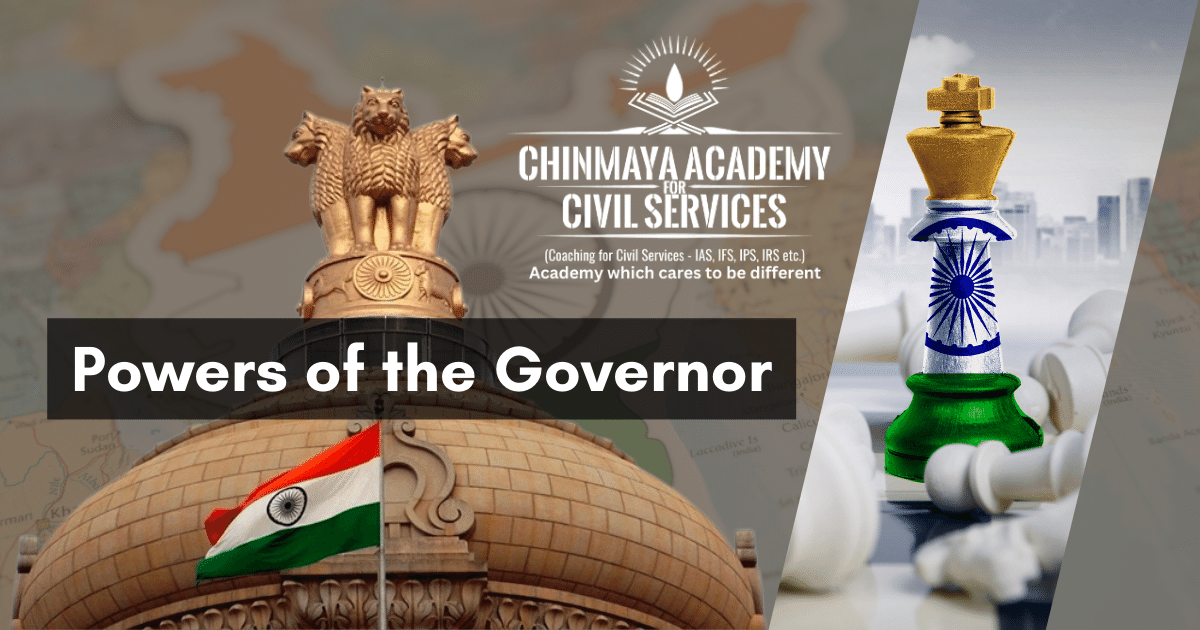
The Governor is the constitutional head of the state who is appointed by the President and holds office during the pleasure of the President. He serves as a crucial conduit between the State and Union governments. The Articles 153 to 162 of the Indian Constitution address the appointment, authority and all other aspects of the position of the Governor.
Powers of the Governor
Executive power
This includes the powers of the Governor to appoint council of ministers, Advocate General of the state, and members of State Public Service Commission and to nominate members to the Legislative council.
Legislative power
Governor has the legislative power to address, send message, summon, prorogue and dissolve the State legislature similar to the legislature powers of the President in the parliament.
Governor also has the power of veto where by he may declare assent to bill, withhold assent or return the bill for reconsideration. He may additionally reserve a bill for the consideration of the President as per his discretion.
Governor has the power to pass an ordinance when either of the two houses are not in session.
Judicial power
Governor has the power to grant pardon, reprieves, respite, remission of punishment and sentence of persons convicted on offences within the executive power of state. He is also consulted by the President in matter of appointment of the Chief Justice and Judges of the High court.
Emergency power
Though the Governor has no emergency powers, he has the power to make a report to President whenever satisfied, thereby inviting President to assume the power of the government of state.
Tussle between Governor and Chief Minister
The Governor is appointed by the President upon the recommendation of the council of ministers. This, in practice, makes him a representative of the union government at the state. It infringes into the federal character and autonomy of the state.
The Governor is also provided with certain constitutional and situational discretionary powers which form the bone of contention. While constitutionally Governor may enjoy discretion in withholding and reserving of bill for President, recommendation on imposition of President’s rule, discretion in sixth schedule areas, situational discretion plays in appointment of chief minister during hung assembly, dissolution of legislature during no-confidence, appoint caretaker government and special provisions as in article 371.
At present several states such as Punjab, Tamil Nadu, Kerala, and Telangana have approached the Supreme Court over the misuse of the discretionary power by the Governor. The Governors have indefinitely withheld assent for a bill passed by the state legislature creating a difficult predicament for the smooth functioning of the state.
Efforts taken to mitigate this struggle
- The Administrative Reforms Commission recommended that the Governor should exercise his own judgment in requesting for President’s rule in state.
- Rajamannar Committee expressed that the Governor should primarily act as impartial constitutional head of the state and not as an agent of the centre.
- Sarkaria Commission later recommended order of preference for selection of a chief minister in case of hung assembly thereby curtailing Governor’s discretionary power to some extent.
- While the National Commission to Review the Working of the Constitution recommended that chief minister should be consulted in the Governor’s appointment Punchhi Commission recommended a committee comprising the Prime Minister, Home Minister, Vice President, Speaker, and the concerned Chief Minister should choose the Governor.
- The Punchhi Commission also recommended removal of the ‘doctrine of pleasure’ and addition of provision for impeachment of the Governor.
- In the S.R. Bommai Judgment, SC laid down the instances of failure of constitutional machinery into four heads- Political crises, Internal subversion, Physical breakdown, Noncompliance with constitutional directions of the Union Executive and allowed it to investigate claims of malafide in the Governor’s report.
More Read
 Chinmaya IAS Academy – Current Affairs Chinmaya IAS Academy – Current Affairs
Chinmaya IAS Academy – Current Affairs Chinmaya IAS Academy – Current Affairs